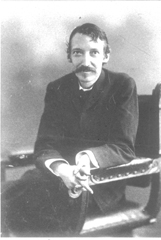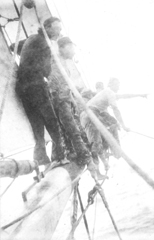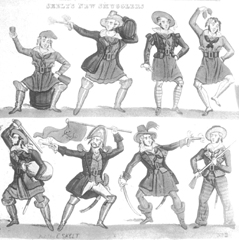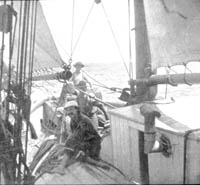Lived-in Books
 The way to read a book, Stevenson often seems to say, is to treat it as if it were life itself. Writing to John Addington Symonds about Crime and Punishment, ‘the greatest book I have read easily in ten years’, Stevenson contrasts his way of reading the book with Henry James’s way of reading.
The way to read a book, Stevenson often seems to say, is to treat it as if it were life itself. Writing to John Addington Symonds about Crime and Punishment, ‘the greatest book I have read easily in ten years’, Stevenson contrasts his way of reading the book with Henry James’s way of reading.
James did not care for it because the character of Raskolnikoff was not objective; and at that I divined a great gulf between us and, on further reflection, the existence of a certain impotence in many minds of today, which prevents them from living in a book or a character, and keeps them standing afar off, spectators of a puppet show. To such I suppose the book may seem empty in the centre; to the others it is a room, a house of life, into which they themselves enter, and are tortured and purified.
What might it mean to ‘live in a book or a character’? What is wrong with ‘standing afar off, spectators of a puppet show’? What is the connection between reading and being ‘tortured and purified’? And why did it mean so much to Stevenson? A survey of Stevenson’s reading habits suggests answers to some of these questions.
It is striking how much Stevenson read. He read favorite books like the Vicomte de Bragelonne (in six volumes!) ‘either five or six’ times, and – so at least he told Mark Twain – he read Huck Finn ‘four times, and am quite ready to begin again tomorrow’, including a kind of double reading on the  first occasion when he ‘read it straight through, [and] began again at the beginning and read it straight through again without a break’. There are pictures of him reading at the dinner table at Heriot Row when his parents were away; reading amidst a severe bout of diarrhoea just before the Devonia set out for New York; reading again at solitary dinners in San Francisco when he was living alone before Fanny’s divorce; and, though he does not give us many pictures of this, we must imagine him also reading on his sick bed, on his many journeys by train and boat and on his walking tours. His letters are filled with references to books he is reading and with requests for more books to be sent to him when he was abroad.
first occasion when he ‘read it straight through, [and] began again at the beginning and read it straight through again without a break’. There are pictures of him reading at the dinner table at Heriot Row when his parents were away; reading amidst a severe bout of diarrhoea just before the Devonia set out for New York; reading again at solitary dinners in San Francisco when he was living alone before Fanny’s divorce; and, though he does not give us many pictures of this, we must imagine him also reading on his sick bed, on his many journeys by train and boat and on his walking tours. His letters are filled with references to books he is reading and with requests for more books to be sent to him when he was abroad.
Anyone can read a lot, but not everyone can summon up from memory so many apt quotations – often just tossed out in passing – as Stevenson does in his letters. He often read books to match his moods. Horace, he reports, feels too urban to suit the atmosphere of the hillside olive groves above Mentone. He reads ‘Maud’ when feeling his love for Mrs Sitwell particularly keenly. Only certain books would do when the ‘black dog’ melancholy gripped him. In a ‘state of intellectual prostration’, the nineteen-year-old RLS announces to his cousin Bob that he is ‘fit for nothing but smoking, and reading Charles Baudelaire’.
One in a long series of poignant disagreements with his father involved a debate, near the end of Thomas Stevenson’s life, over the relative merits of reading Lockhart’s Life of Scott as opposed to the Waverley novels when one was depressed. Just come from reading Lockhart, Stevenson advises his father, sunk deep in gloom, ‘not to read [the Life]; as it has made me very ill and would make you worse.’ He’s thinking of the ending of the biography, with its graphic depictions of Scott’s failing mental faculties, to which ‘no Waverley novel approaches in power, blackness, bitterness and moral elevation… and yet the Waverley novels are better reading for every day than the life. You may take a tonic daily, but not phlebotomy’. Stevenson apologised to his father at the end of this letter for having sent him a sermon, but in many ways this was not a sermon but a prescription: reading as therapy. It even worked for serious physical illnesses: Sherlock Holmes, as he told Conan Doyle, provided a ‘for the moment effectual’ cure for pleurisy.
Besides the reading Stevenson did to raise his spirits or to pass the time, there was the copious reading he needed to do as research for his own writing. He ranged omniverously from a missionary’s impressions of the Outer Hebrides in the late eighteenth century, to his grandfather’s diaries and letters, to books on hot-air balloons. And of course there were all those times as a sedulous ape, when books were not companions, or therapy, or research, but textbooks on style.
Stevenson opens his ‘Gossip on Romance’ with a sustained cry of enthusiasm for reading:
In anything fit to be called by the name of reading, the process itself should be absorbing and voluptuous; we should gloat over a book, be rapt clean out of ourselves, and rise from the perusal, our mind filled with the busiest, kaleidoscopic dance of images, incapable of sleep or of continuous thought. The words, if the book be eloquent, should run thenceforward in our ears like the noise of breakers, and the story, if it be a story, repeat itself in a thousand coloured pictures to the eye.
This excitement runs throughout his letters. To Fanny Sitwell in 1873: ‘I have found here a new friend, to whom I grow daily more devoted – George Sand. I go on from one novel to another and think the last I have read the most sympathetic and friendly in tone, until I have read another.’
To James Payn in 1881, in praise of the hero of his novel A Grape from a Thorn: ‘Hip, hip, hurrah for Charles Edward!’ Then, after a kind of medallion drawn on the page, praising author and hero (‘Vive le prince!… Bully for you!… James Payn for ever…’), a postscript only slightly more sober: ‘Do not let my childishness blind you to the serious nature of my admiration; Charles Edward is really a fine thing: the devil a man alive that could have looked near it!’
To W.E. Henley in 1885 of Crime and Punishment: ‘it is not reading a book, it is having a brain fever, to read it’.
Stevenson favours certain metaphors in his discussions of reading. A book becomes a house, or a location that one inhabits – appropriate language from a writer whose fiction contains such vivid attention to place. When contrasting his reading of Crime and Punishment with Henry James’s, Stevenson spoke about a book as ‘a house of life’. In ‘A Gossip on a Novel of Dumas’s’ he discusses those books he used to read but reads no longer as ‘houses which were once like home to me, but where I now rarely visit’.
Another example of reading as the act of visiting a locale comes in reply to Sidney Colvin, who, writing in 1891 from Lochinvar in the far north of Scotland to Stevenson in Samoa, a little tactlessly asks if he were ever ‘homesick for the Highlands and the Isles.’ (Was he goading his friend to come back to Britain?) Stevenson does not rise to the bait but replies that he had in fact just been visiting these areas himself: ‘Conceive that for the last month I have been living there between 1786 and 1850, in my grandfather’s diaries and letters.’
He often talks about reading in the language normally reserved for personal relationships. He speaks of authors as though they are intimates of his. Montaigne, for instance, ‘is the most charming of table-companions’. Rather than a friend, someone like Chateaubriand appears as the kind of person we want to avoid in the streets, a cad, in nineteenth-century terms: ‘What a miraculous ideal of literary demerit Chateaubriand is. Of course, he is very clever to the last degree; but he is such a – liar, that I cannot away with him. He is more antipathetic to me than anyone else in the world.’
 Not just authors but books themselves take on the language of human relationships. We ‘revisit’ books ‘as we choose and revisit human friends’. He speaks of favourite male characters such as d’Artagnan as friends and of female characters as objects of his love. Telling Henry James of his delight in the character of Adela Chart from the story ‘The Marriages’ he proclaims, ‘I could live and die with Adela’ and includes a love poem to her:
Not just authors but books themselves take on the language of human relationships. We ‘revisit’ books ‘as we choose and revisit human friends’. He speaks of favourite male characters such as d’Artagnan as friends and of female characters as objects of his love. Telling Henry James of his delight in the character of Adela Chart from the story ‘The Marriages’ he proclaims, ‘I could live and die with Adela’ and includes a love poem to her:
Adela, Adela, Adela Chart
What have you done to my elderly heart?
Of all the ladies of paper and ink
I count you the paragon, call you the pink.
There many moments in his letters when (often just after he has given one of his enthusiastic outbursts) he offers an objective, critical assessment of what he has just read. Most of his youthful letters to his cousin Bob, for instance, contain attempts at sophisticated literary criticism, such as the way, aged sixteen, and in contrast to how he was later to write about the book, he judges Dumas’s Vicomte de Bragelonne a disappointing novel. ‘The conversations are certainly wonderful, but the strength of the plot is frittered away, and the whole story is lengthened out to a most unconscionable and dreary extent. The strength of Porthos, and the furiously acute intellects of Aramis and D’Artagnan are singularly overdone.’
In later letters, Stevenson’s tone is rarely objective. Stevenson can offer a sound critical assessment of the quality of the literature, but his final response comes in the language of personal experience. Reading took him out of himself, not just intellectually, but on a deep, emotional level. In ‘A Humble Remonstrance’ Stevenson describes the action of reading a romance:
Something happens as we desire to have it happen to ourselves; some situation, that we have long dallied with in fancy, is realised in the story with enticing and appropriate details. Then we forget the characters; then we push the hero aside; then we plunge into the tale in our own person and bathe in fresh experience; and then, and then only, do we say we have been reading a romance.
Works of fiction ‘disengage us from ourselves’, he says in ‘Books Which Have Influenced Me’; they are like life ‘but with a singular change – that monstrous, consuming ego of ours being, for the nonce, struck out’. Stevenson gave usan archetypal image of escaping from the self: Jekyll’s taking the potion in order to leave his own self behind and live in the life of that other, Mr Hyde. If this were just escapism, then the game would be over. We would enjoy our spell with the book and return through the small door in the courtyard, drink our chemicals and return to our old selves, like Jekyll, unchanged. But the influence of books ‘is profound and silent… they mould by contact; we drink them up like water, and are bettered, yet know not how’. This is more like an alchemical transformation that, once the ego is out of the way, refines the self in a mysterious, not to say mystical, way.
It is not only in fiction that this occurs. Through biography Stevenson merged himself into the person whose life he was reading. Sometimes a change worked upon him unawares, as reading the lives of Goethe and Balzac contributed to that subtle change in his own life from ‘one whose business was to shirk into one whose business was to strive and persevere’, a change during which ‘I was never conscious of a struggle, nor registered a vow, nor seemingly had anything personally to do with the matter’.
Drawn into Meredith’s The Egoist, Stevenson comments, ‘It is yourself that is hunted down; these are our own faults that are dragged into the day and numbered… I think Willoughby an unmanly but a very serviceable exposure of myself.’ Reading Dowden’s biography of Shelley, Stevenson confesses to Lady Taylor: ‘I was uneasy at my resemblances to Shelley; I seem but a Shelley with less oil, and no genius; though I have had the fortune to live longer and (partly) to grow up’.
 From reading Marcus Aurelius he carried away ‘a memory of the man himself; it is as though you had touched a loyal hand, looked into brave eyes, and made a noble friend; there is another bond on you thenceforward, binding you to life and to the love of virtue’.
From reading Marcus Aurelius he carried away ‘a memory of the man himself; it is as though you had touched a loyal hand, looked into brave eyes, and made a noble friend; there is another bond on you thenceforward, binding you to life and to the love of virtue’.
This process of encountering something other than oneself and adjusting and growing from the encounter gets its fullest attention in the essay ‘Books Which Have Influenced Me’. Here it becomes plain that Stevenson has not been talking about mere identification with the character or confusion of a literary voice with a real person. He refers to ‘the gift of reading’, which
consists, first of all, in a vast intellectual endowment – a free grace, I find I must call it – by which a man rises to understand that he is not punctually right, nor those from whom he differs absolutely wrong… Something that seems quite new, or that seems insolently false or very dangerous, is the test of a reader. If he tries to see what it means, what truth excuses it, he has the gift, and let him read. If he is merely hurt, or offended, or exclaims upon his author’s folly, he had better take to the daily papers; he will never be a reader.
Reading Whitman, engaging with those ideas so radically at odds with conventional nineteenth-century morals, ‘tumbled the world upside down for me, blew into space a thousand cobwebs of genteel and ethical illusion, and, having thus shaken my tabernacle of lies, set me back again upon a strong foundation of all the original and manly virtues’.
This ‘gift of reading’ challenges complacency and conventional values by a process that is individual and unique, an act of grace. It is not a comfortable or easy gift. It can only be painful to enter the house of a tortured spirit and live for a while with Raskolnikov or Jekyll. In the cheerful banter with which Stevenson so often speaks about his reading there is no effort to efface the shadow side, the struggle to escape the boundaries of self.
Copyright Robert Louis Abrahamson 2005.

Comments